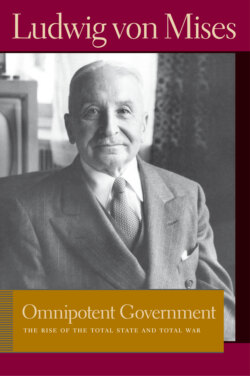Читать книгу Omnipotent Government - Людвиг фон Мизес - Страница 19
На сайте Литреса книга снята с продажи.
5. The “Little German” Program
ОглавлениеThe Prussian Progressives did not fight in the Constitutional Conflict for the destruction or weakening of the Prussian Army. They realized that under the circumstances Germany was in need of a strong army for the defense of its independence. They wanted to wrest the army from the King and to transform it into an instrument for the protection of German liberty. The issue of the conflict was whether the King or Parliament should control the army.
The aim of German liberalism was the replacement of the scandalous administration of the thirty-odd German states by a unitary liberal government. Most of the liberals believed that this future German state must not include Austria. Austria was very different from the other German-speaking countries; it had problems of its own which were foreign to the rest of the nation. The liberals could not help seeing Austria as the most dangerous obstacle to German freedom. The Austrian court was dominated by the Jesuits, its government had concluded a concordat with Pius IX, the pope who ardently combated all modern ideas. But the Austrian Emperor was not prepared to renounce voluntarily the position which his house had occupied for more than four hundred years in Germany. The liberals wanted the Prussian Army strong because they were afraid of Austrian hegemony, a new Counter-Reformation, and the reëstablishment of the reactionary system of the late Prince Metternich. They aimed at a unitary government for all Germans outside of Austria (and Switzerland). They therefore called themselves Little Germans (Kleindeutsche) as contrasted to the Great Germans (Grossdeutsche) who wanted to include those parts of Austria which had previously belonged to the Holy Empire.
But there were, besides, other considerations of foreign policy to recommend an increase in the Prussian Army. France was in those years ruled by an adventurer who was convinced that he could preserve his emperorship only by fresh military victories. In the first decade of his reign he had already waged two bloody wars. Now it seemed to be Germany’s turn. There was little doubt that Napoleon III toyed with the idea of annexing the left bank of the Rhine. Who else could protect Germany but the Prussian Army?
Then there was one problem more, Schleswig-Holstein. The citizens of Holstein, of Lauenburg, and of southern Schleswig bitterly opposed the rule of Denmark. The German liberals cared little for the sophisticated arguments of lawyers and diplomats concerning the claims of various pretenders to the succession in the Elbe duchies. They did not believe in the doctrine that the question of who should rule a country must be decided according to the provisions of feudal law and of century-old family compacts. They supported the Western principle of self-determination. The people of these duchies were reluctant to acquiesce in the sovereignty of a man whose only title was that he had married a princess with a disputed claim to the succession in Schleswig and no right at all to the succession in Holstein; they aimed at autonomy within the German Confederation. This fact alone seemed important in the eyes of the liberals. Why should these Germans be denied what the British, the French, the Belgians, and the Italians had got? But as the King of Denmark was not ready to renounce his claims, this question could not be solved without a recourse to arms.
It would be a mistake to judge all these problems from the point of view of later events. Bismarck freed Schleswig-Holstein from the yoke of its Danish oppressors only in order to annex it to Prussia; and he annexed not only southern Schleswig but northern Schleswig as well, whose population desired to remain in the Danish kingdom. Napoleon III did not attack Germany; it was Bismarck who kindled the war against France. Nobody foresaw this outcome in the early ’sixties. At that time everybody in Europe, and in America too, deemed the Emperor of France the foremost peacebreaker and aggressor. The sympathies which the German longing for unity encountered abroad were to a great extent due to the conviction that a united Germany would counterbalance France and thus make Europe safe for peace.
The Little Germans were also misled by their religious prejudices. Like most of the liberals they thought of Protestantism as the first step on the way from medieval darkness to enlightenment. They feared Austria because it was Catholic; they preferred Prussia because the majority of its population was Protestant. In spite of all experience they hoped that Prussia was more open to liberal ideas than Austria. Political conditions in Austria, to be sure, were in those critical years unsatisfactory. But later events have proved that Protestantism is no more a safeguard of freedom than Catholicism. The ideal of liberalism is the complete separation of church and state, and tolerance—without any regard to differences among the churches.
But this error also was not limited to Germany. The French liberals were so deluded that they at first hailed the Prussian victory at Königgrätz (Sadova). Only on second thought did they realize that Austria’s defeat spelled the doom of France too, and they raised—too late—the battle cry Revanche pour Sadova.
Königgrätz was at any rate a crushing defeat for German liberalism. The liberals were aware of the fact that they had lost a campaign. They were nevertheless full of hope. They were firmly resolved to proceed with their fight in the new Parliament of Northern Germany. This fight, they felt, must end with the victory of liberalism and the defeat of absolutism. The moment when the King would no longer be able to use “his” army against the people seemed to come closer every day.
